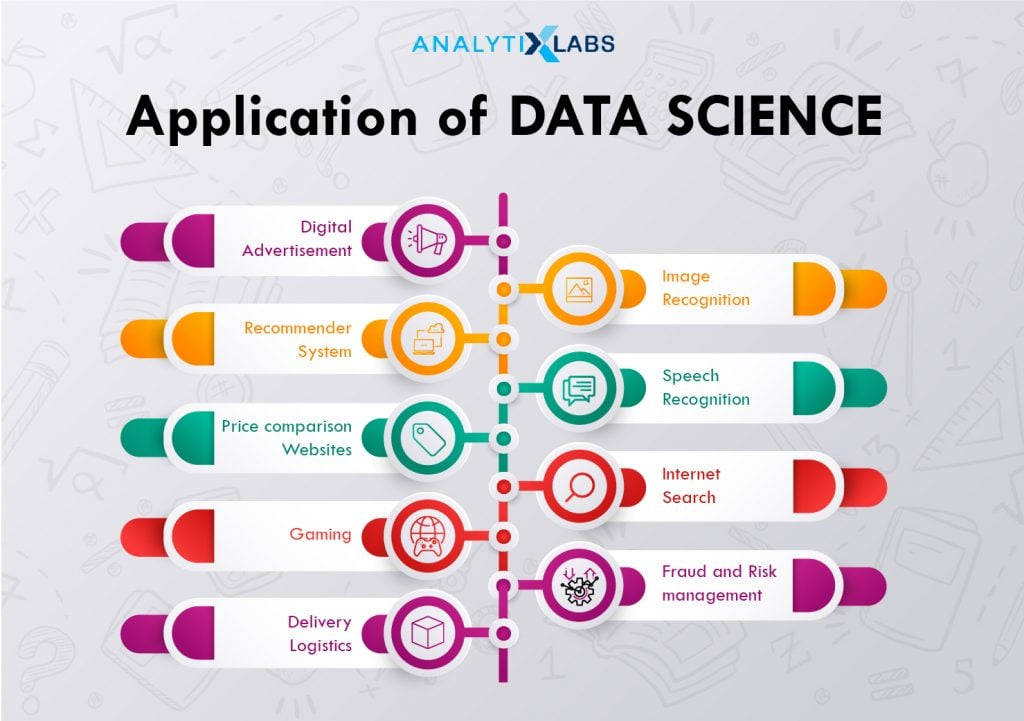Data Science
Data science is the study of data that helps us derive useful insight for business decision making. Data Science is all about using tools, techniques, and creativity to uncover insights hidden within data. It combines math, computer science, and domain expertise to tackle real-world challenges in a variety of fields.
Data Science processes the raw data and solve business problems and even make prediction about the future trend or requirement. For example, from the huge raw data of a company, data science can help answer following question:
- What do customer want?
- How can we improve our services?
- What will the upcoming trend in sales?
- How much stock they need for upcoming festival.

In short, data science empowers the industries to make smarter, faster, and more informed decisions. In order to find patterns and achieve such insights, expertise in relevant domain is required. With expertise in Healthcare, a data scientists can predict patient risks and suggest personalized treatments.
Data science involves these key steps:
- Data Collection: Gathering raw data from various sources, such as databases, sensors, or user interactions.
- Data Cleaning: Ensuring the data is accurate, complete, and ready for analysis.
- Data Analysis: Applying statistical and computational methods to identify patterns, trends, or relationships.
- Data Visualization: Creating charts, graphs, and dashboards to present findings clearly.
- Decision-Making: Using insights to inform strategies, create solutions, or predict outcomes.
Increasing Demand of Data Science
Data Science is most promising and high in-demand career path. Given the massive amount of data rapidly increasing in every industry, demand of data scientists is expected to grow further by 35% in 2025. Today’s data science is not limited to only analyzing data, or understanding past trends. Empowered with AI, ML and other advanced techniques, data science can solve real-word problems and train advance systems without human intervention.
Why Is Data Science Important?
In a world flooded with user-data, data science is crucial for driving progress and innovation in every industry. Here are some key reasons why it is so important:
- Helps Business in Decision-Making: By analyzing data, businesses can understand trends and make informed choices that reduce risks and maximize profits.
- Improves Efficiency: Organizations can use data science to identify areas where they can save time and resources.
- Personalizes Experiences: Data science helps create customized recommendations and offers that improve customer satisfaction.
- Predicts the Future: Businesses can use data to forecast trends, demand, and other important factors.
- Drives Innovation: New ideas and products often come from insights discovered through data science.
- Benefits Society: Data science improves public services like healthcare, education, and transportation by helping allocate resources more effectively.
Real Life Example of Data Science
There are lot of examples you can observe around yourself, where data science is being used. For Example – Social Media, Medical, Preparing strategy for Cricket or FIFA by analyzing past matches. Here are some more real life examples:
Social Media Recommendation:
Have you ever wondered why you always get Instagram Reels aligned towards your interest? These platforms uses data-science to Analyze your past interest/data (Like, Comments, watch etc) and create personalized recommendation to serve content that matches your interests.
Early Diagnosis of Disease:
Data Science can predicts the risk of conditions like diabetes or heart disease, by analyzing a patient’s medical records and lifestyle habits. This allows doctors to act early and improve lives. In Future, it can help doctors detect diseases before symptoms even start to appear. For example, predicting a Tumor or Cancer at a very early stage. Data Science uses medical history and Image-data for such prediction.
E-commerce recommendation and Demand Forecast:
E-commerce platforms like Amazon or Flipkart use data science to enhance the shopping experience. By analyzing your browsing history, purchase behavior, and search patterns, they recommend products based on your preferences. It can also help in predicting demand for products by studying past sales trends, seasonal patterns etc.
Applications of Data Science
Data science has a wide range of applications across various industries, by transforming how they operate and deliver results. Here are some examples:
- Data science is used to analyze patient data, predict diseases, develop personalized treatments, and optimize hospital operations.
- It helps detect fraudulent transactions, manage risks, and provide personalized financial advice.
- Businesses use data science to understand customer behavior, recommend products, optimize inventory, and improve supply chains.
- Data science powers innovations like search engines, virtual assistants, and recommendation systems.
- It enables route optimization, traffic management, and predictive maintenance for vehicles.
- Data science helps in designing personalized learning experiences, tracking student performance, and improving administrative efficiency.
- Streaming platforms and content creators use data science to recommend shows, analyze viewer preferences, and optimize content delivery.
- Companies leverage data science to segment audiences, predict campaign outcomes, and personalize advertisements.
Industry where data science is used
Data science is transforming every industry by unlocking the power of data. Here are some key sectors where data science plays a vital role:
- Healthcare: Data science improves patient outcomes by using predictive analytics to detect diseases early, creating personalized treatment plans and optimizing hospital operations for efficiency.
- Finance: Data science helps detect fraudulent activities, assess and manage financial risks, and provide tailored financial solutions to customers.
- Retail: Data science enhances customer experiences by delivering targeted marketing campaigns, optimizing inventory management, and forecasting sales trends accurately.
- Technology: Data science powers cutting-edge AI applications such as voice assistants, intelligent search engines, and smart home devices.
- Transportation: Data science optimizes travel routes, manages vehicle fleets effectively, and enhances traffic management systems for smoother journeys.
- Manufacturing: Data science predicts potential equipment failures, streamlines supply chain processes, and improves production efficiency through data-driven decisions.
- Energy: Data science forecasts energy demand, optimizes energy consumption, and facilitates the integration of renewable energy resources.
- Agriculture: Data science drives precision farming practices by monitoring crop health, managing resources efficiently, and boosting agricultural yields.
Important Data Science Skills
Data Scientists need a mix of technical and soft skills to excel in this domain. To start with data science, it’s important to learn the basics like Mathematics and Basic programming skills. Here are some essential skills for a successful career in data science:
- Programming: Proficiency in programming languages like Python, R, or SQL is crucial for analyzing and processing data effectively.
- Statistics and Mathematics: A strong foundation in statistics and linear algebra helps in understanding data patterns and building predictive models.
- Machine Learning: Knowledge of machine learning algorithms and frameworks is key to creating intelligent data-driven solutions.
- Data Visualization: The ability to present data insights through tools like Tableau, Power BI, or Matplotlib ensures findings are clear and actionable.
- Data Wrangling: Skills in cleaning, transforming, and preparing raw data for analysis are vital for maintaining data quality.
- Big Data Tools: Familiarity with tools like Hadoop, Spark, or cloud platforms helps in handling large datasets efficiently.
- Critical Thinking: Analytical skills to interpret data and solve problems creatively are essential for uncovering actionable insights.
- Communication: The ability to explain complex data findings in simple terms to stakeholders is a valuable asset.



Comments
Post a Comment